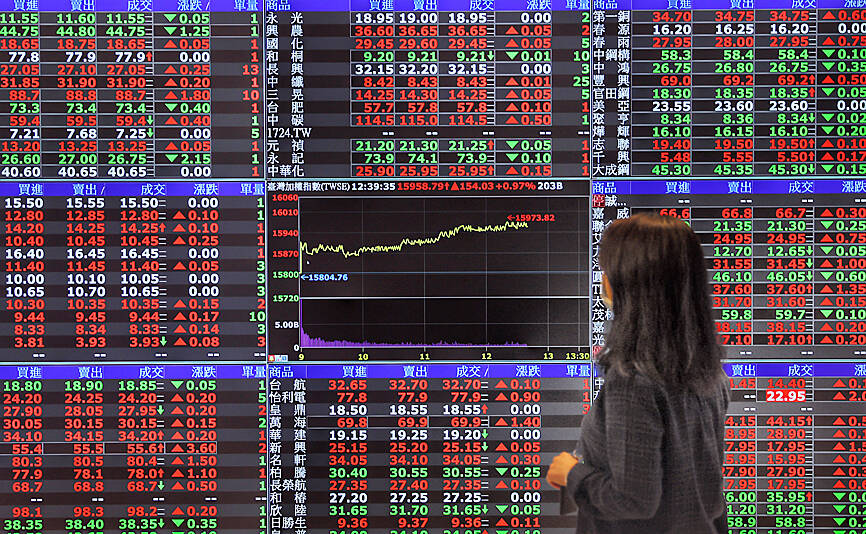The TAIEX yesterday rallied 0.79 percent, or 124.67 points, to 15,929.43, as cooling inflation in the US fed hope for interest rate hike pauses, overriding concerns over the National Stabilization Fund’s decision to exit the market, officials and analysts said.
The local bourse took cues from Wall Street, where investors breathed a sigh of relief after the US producers’ price index last month declined 0.5 percent from February and grew a weaker-than-expected 2.7 percent year-on-year, making further rate hikes unnecessary.
Deputy Minister of Finance Frank Juan (阮清華), who is executive secretary of the National Stabilization Fund, said there is no need to worry about the fund’s exit, which would be done gradually to limit its impact.

Photo: CNA
The government in July last year activated NT$500 billion (US$16.41 billion) of the fund to shore up local shares that took a hard hit amid drastic interest rate hikes by major central banks to combat steep inflation.
“The rally [yesterday] confirmed the health of local shares and investors should have confidence,” Juan told reporters on the sidelines of a public function.
The National Stabilization Fund on Thursday said it would end its longest streak of intervention, during which the TAIEX gained 13.29 percent from 13,950 to 15,804.
The National Stabilization Fund was mostly inactive last quarter, Juan said.
It had spent NT$54.5 billion as of the end of last month to shore up local shares, generating more than NT$8 billion in unrealized gains, or a return of 13.01 percent, data showed.
“The fund has not spent extra money since the end of last year, indicating that the market has recovered on its own and the fund has served its purpose,” Juan said.
Turnover yesterday totaled NT$249.613 billion after foreign institutional players increased their combined stake by NT$14.91 billion, while proprietary dealers added NT$327 million, Taiwan Stock Exchange data showed.
Mutual funds trimmed their combined net position by NT$676.41 million, the data showed.
Heavyweight players such as Taiwan Semiconductor Manufacturing Co (台積電) closed up 1.18 percent at NT$516 ahead of its earnings conference on Thursday next week.
The increase reversed days of retreat after the world’s largest chip supplier on Monday released its first-quarter revenue, which missed its guidance, analysts said.
Tourism firms lent a helping hand after delivering combined revenue on par with business improvement expectations, analysts said.
Shares of Formosa International Hotels Corp (晶華國際酒店集團) grew 4.06 percent to NT$295, while Lion Travel Service Co (雄獅旅行社) closed up 9.82 percent, near the daily limit, at NT$179, exchange data showed.
Speaking on the sidelines of a legislative hearing in Taipei, Vice Premier Cheng Wen-tsan (鄭文燦) said it appeared that foreign institutional investors were ready to rebuild their holdings in the local stock market, which is another reason that the stabilization fund committee at a meeting on Thursday said that it would terminate its intervention.
While the fund would unload the shares it has acquired during its 275-day intervention, that would not affect stock prices, Cheng said.
Additional reporting by CNA

Nvidia Corp chief executive officer Jensen Huang (黃仁勳) on Monday introduced the company’s latest supercomputer platform, featuring six new chips made by Taiwan Semiconductor Manufacturing Co (TSMC, 台積電), saying that it is now “in full production.” “If Vera Rubin is going to be in time for this year, it must be in production by now, and so, today I can tell you that Vera Rubin is in full production,” Huang said during his keynote speech at CES in Las Vegas. The rollout of six concurrent chips for Vera Rubin — the company’s next-generation artificial intelligence (AI) computing platform — marks a strategic

Enhanced tax credits that have helped reduce the cost of health insurance for the vast majority of US Affordable Care Act enrollees expired on Jan.1, cementing higher health costs for millions of Americans at the start of the new year. Democrats forced a 43-day US government shutdown over the issue. Moderate Republicans called for a solution to save their political aspirations this year. US President Donald Trump floated a way out, only to back off after conservative backlash. In the end, no one’s efforts were enough to save the subsidies before their expiration date. A US House of Representatives vote

REVENUE PERFORMANCE: Cloud and network products, and electronic components saw strong increases, while smart consumer electronics and computing products fell Hon Hai Precision Industry Co (鴻海精密) yesterday posted 26.51 percent quarterly growth in revenue for last quarter to NT$2.6 trillion (US$82.44 billion), the strongest on record for the period and above expectations, but the company forecast a slight revenue dip this quarter due to seasonal factors. On an annual basis, revenue last quarter grew 22.07 percent, the company said. Analysts on average estimated about NT$2.4 trillion increase. Hon Hai, which assembles servers for Nvidia Corp and iPhones for Apple Inc, is expanding its capacity in the US, adding artificial intelligence (AI) server production in Wisconsin and Texas, where it operates established campuses. This

US President Donald Trump on Friday blocked US photonics firm HieFo Corp’s US$3 million acquisition of assets in New Jersey-based aerospace and defense specialist Emcore Corp, citing national security and China-related concerns. In an order released by the White House, Trump said HieFo was “controlled by a citizen of the People’s Republic of China” and that its 2024 acquisition of Emcore’s businesses led the US president to believe that it might “take action that threatens to impair the national security of the United States.” The order did not name the person or detail Trump’s concerns. “The Transaction is hereby prohibited,”